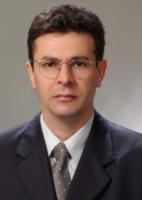Tatic, Kasim | Bosnia Herzegovina

Kasim Tatic is an associate professor at the Faculty of Economics, University of Sarajevo, Bosnia and Herzegovina. He is teaching Microeconomics, Managerial Economics, Theory of the firm and Industrial organization. He did his undergraduate studies at the Faculty of Economics, University of Sarajevo, where he graduated in economics, major finance and accounting. He took his master degree at the Faculty of Economics, University of Belgrade, in 1991. Master thesis - “Scientific-technological Progress, Economic Growth and Environment”. He received his Ph.D. at the Faculty of Economics, University of Sarajevo in the year 2000. Doctoral thesis- “Microeconomic Aspects of Optimization of the Usage and Protection of the Environment”.
He is also professor on the subject „Social and economic aspects of environmental protection“ on the Postgraduate study - Faculty of Natural Sciences, University of Sarajevo. His research focuses on sustainable development at the company and the state level; relation between scientific and technological progress,economic growth and environment and natural resources; usage of information and communication technologies and their impact on business models, competitiveness and strategic management; functioning and regulation of public companies – primarily in telecom sector.
He has been lecturer on several international postgraduate courses. Working experience: Faculty of Economics, Sarajevo: Vice Dean and Director of the Center for International Cooperation, Head of Zenica Department; United States Agency for International Development (USAID), Sarajevo: Project manager; Ministry for Refugees and Social Welfare of Bosnia and Herzegovina: Director of the Agency for Humanitarian Aid; “FONDEKO”- Foundation for Promotion of Sustainable Development and Quality of Life, Sarajevo: Executive Director; Economic Institute Sarajevo: Research Fellow, Head of the European Documentation Center.
Project at IAS-STS: Scientific-technological progres, competitiveness and natural resources
Economic growth is an important goal highly ranked on the agenda of all the countries in the world. But since 1970s most developed countries admited significant environmental quality deterioration and natural resources overexploatation. In other words economic growth pattern was recognized as unsustainable in the long run. The main response of all countries was mainly in the form of technological progress. That way have been achieved significant results in reducing the consumption of material and energy per unit of commodity or service produced. Hence, technological progress has been considered as a factor that will enable „decoupling“ environment and natural resources use from economic growth. In our lecture we bring into question such a belief, analysing the main factors that leed to „intangible“ economics and stressing among other things the difference between concepts of relative and absolute scarcity, and absolute and relative decoupling. Using the estimates of the EU Directorate for natural resources and environment we would like to show that the absolute consumption of natural resources (total number of units multiplying with the per unit consumption of environmental services, material and energy) will further increase, not decrease, in the world in the next twenty to thirty years.
This is important since some very influental authors and institutions hold that the importance of natural resource will decrease in the future, particularly as a factor of competitive advantages. Regardless of some evident results that primarily information and communication technologies (ICT) have achieved in the sense of dematerialization of the whole economy, constantly increasing GDP and material production have reversed the overall positive trends. The neoclasical economics aproach toward the economic growth is still very influental. One can realize that while reading the „Global Competitiveness Report for 2004/2005“ prepared by the World Economic Forum. Professor Michael Porter, in despite of his famous Porter hypotesis, based entirelly his approach to competitivenes in the Report on the premises of the neoclasical economy, underestimating the role of natural resources and neglecting practically the concept and basic ideas of environmentaly sustainable development. We have briefly made the critical comment on these issues in the Report. Some interesting and provocative new ideas on competitiveness of the nations in the era of „knowledge based economy“ will be presented.
Selected Publications
Informatization, Entrepreneurship and Internationalization: The Business Sector of Bosnia and Herzegovina", article to be published in Managing Global Transition: International Research Journal, Koper, Slovenija, 24-26, November 2005. Currently on the web page: http://www.fm-kp.si/ - Conference proceedings
Financing of the environmental protection projects: the role and significance of the environmental funds, Faculty of Economics Sarajevo, Collection of papers, nr. 25, Sarajevo 2005, p. 501-519
Privatization of Natural Monopolies in Bosnia and Herzegovina, UNDP, Early Warning System Collection - Special Issue, May 2004, p. 37
Market structures and economic efficiency, Faculty of Economics Sarajevo Publishing department, Sarajevo, 2003, p. 167, ISBN 9958-605-49-X, COBISS.BH-ID 12247046Y
Information and communication technologies (ICT) in the sector of education, in: "The Role and Importance of Scientific and Technological Progress in Development of New Economy", International Forum Bosnia Project, Sarajevo, Decembar 2003.p. 102-127
Information and Communication Technologies and Economy, chapter in the book "Millenium Development Goals and the Information Society", UNDP, International Conference material, Sarajevo, May 2003, p. 1 - 87
Environmental policy, chapter in: "Bosnia and Herzegovina Competitiveness Report 2002" - Academy of Science and Arts of Bosnia and Herzegovina and Management Information Technologies Center, Sarajevo, 2003, p. 151 - 162, ISSN 1512-8636
